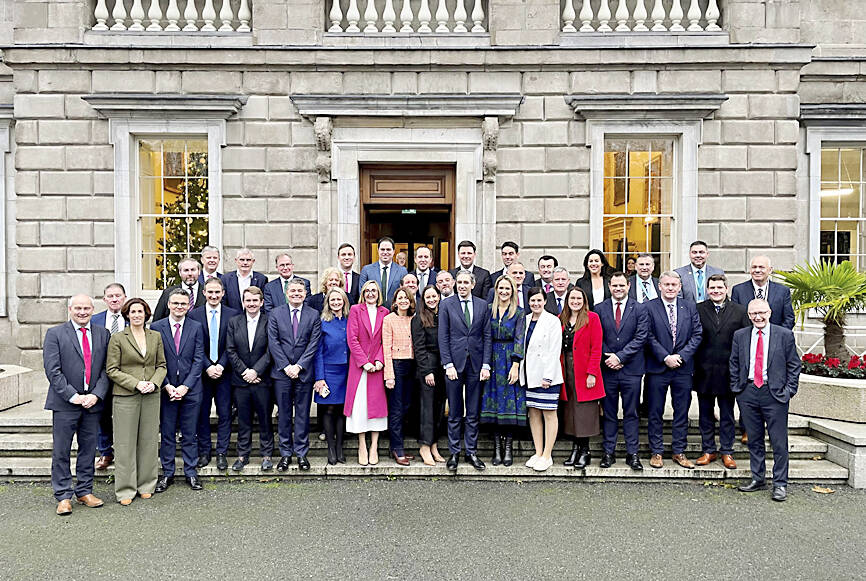Ireland’s new parliament has the lowest proportion of female parliamentarians in Western Europe, an analysis has revealed, suggesting that a country that elected its first female president more than three decades ago has trailed behind when it comes to the inclusion of women in politics.
An analysis of Inter-Parliamentary Union data by Bloomberg described the Irish parliament as the “worst for gender diversity in western Europe.”
Out of the 174 seats up for grabs in last month’s election, 44 went to women, amounting to a representation of slightly more than 25 percent — a stark contrast to the Western European average of 37 percent when it comes to female parliamentarians.

Photo: AP
Across Europe as a whole, female parliamentarians make up an average of 32 percent of parliaments.
Ireland adopted gender quotas in 2012, with the requirement boosted to 40 percent in the most recent election. The result was 246 female candidates — the highest number registered to run in an Irish general election.
Of these candidates, 44 were elected to the Dail Eireann, or lower house of the Irish parliament. While campaigners noted that this figure marked a slight increase from the previous election, they were swift to add that it was also indicative of the work that remained to be done.
“It’s progress, but it’s slow progress,” said Women for Election, which promotes women’s participation in Irish politics.
The National Women’s Council of Ireland said the results meant there was still “no breakthrough for women” in Irish politics.
“The results show that, in isolation, the gender quota will not be enough to achieve equal representation for women,” said Orla O’Connor, the council’s director. “There is evidence that many women were added late to the ticket to make up the gender quota.
“We are calling on all political parties to ensure women candidates are selected as early as possible to ensure they have sufficient time, support and resources for their election campaign,” she added.

Brazil, the world’s largest Roman Catholic country, saw its Catholic population decline further in 2022, while evangelical Christians and those with no religion continued to rise, census data released on Friday by the Brazilian Institute of Geography and Statistics (IBGE) showed. The census indicated that Brazil had 100.2 million Roman Catholics in 2022, accounting for 56.7 percent of the population, down from 65.1 percent or 105.4 million recorded in the 2010 census. Meanwhile, the share of evangelical Christians rose to 26.9 percent last year, up from 21.6 percent in 2010, adding 12 million followers to reach 47.4 million — the highest figure

A Chinese scientist was arrested while arriving in the US at Detroit airport, the second case in days involving the alleged smuggling of biological material, authorities said on Monday. The scientist is accused of shipping biological material months ago to staff at a laboratory at the University of Michigan. The FBI, in a court filing, described it as material related to certain worms and requires a government permit. “The guidelines for importing biological materials into the US for research purposes are stringent, but clear, and actions like this undermine the legitimate work of other visiting scholars,” said John Nowak, who leads field

‘THE RED LINE’: Colombian President Gustavo Petro promised a thorough probe into the attack on the senator, who had announced his presidential bid in March Colombian Senator Miguel Uribe Turbay, a possible candidate in the country’s presidential election next year, was shot and wounded at a campaign rally in Bogota on Saturday, authorities said. His conservative Democratic Center party released a statement calling it “an unacceptable act of violence.” The attack took place in a park in the Fontibon neighborhood when armed assailants shot him from behind, said the right-wing Democratic Center, which was the party of former Colombian president Alvaro Uribe. The men are not related. Images circulating on social media showed Uribe Turbay, 39, covered in blood being held by several people. The Santa Fe Foundation

NUCLEAR WARNING: Elites are carelessly fomenting fear and tensions between nuclear powers, perhaps because they have access to shelters, Tulsi Gabbard said After a trip to Hiroshima, US Director of National Intelligence Tulsi Gabbard on Tuesday warned that “warmongers” were pushing the world to the brink of nuclear war. Gabbard did not specify her concerns. Gabbard posted on social media a video of grisly footage from the world’s first nuclear attack and of her staring reflectively at the Hiroshima Peace Memorial. On Aug. 6, 1945, the US obliterated Hiroshima, killing 140,000 people in the explosion and by the end of the year from the uranium bomb’s effects. Three days later, a US plane dropped a plutonium bomb on Nagasaki, leaving abut 74,000 people dead by the